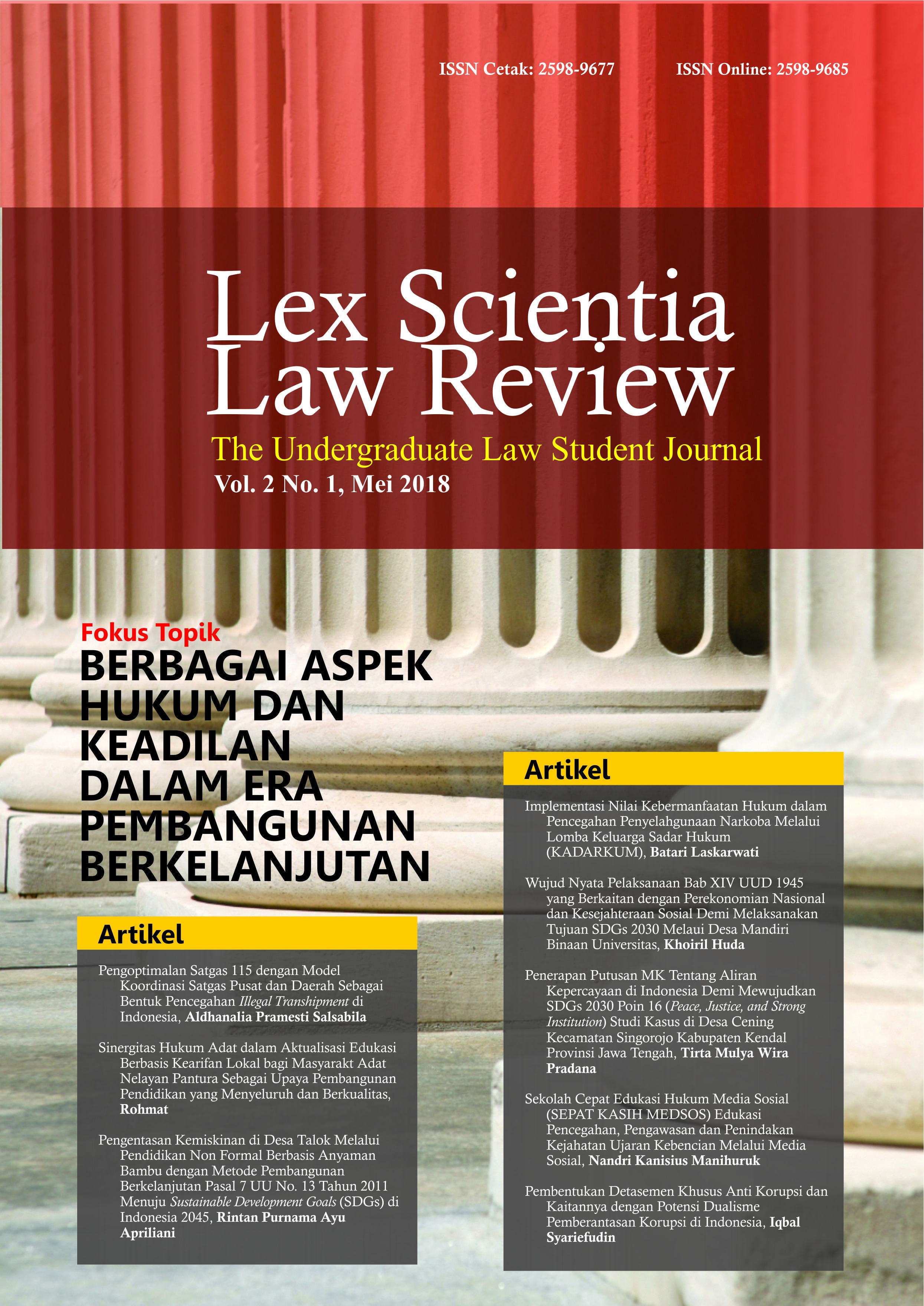Application of the Constitutional Court's decision on the recognition of the flow of trust in Indonesia in order to realize SDG's 2030 points 16 (Peace, Justice, and Strong Institution) Case Study in Cening Village, Singorojo District, Kendal Regency Penerapan Putusan MK Tentang Pengakuan Aliran Kepercayaan di Indonesia Demi mewujudkan SDG's 2030 Poin 16 (Peace, Justice, and Strong Institution) Studi Kasus Di Desa Cening, Kecamatan Singorojo, Kabupaten Kendal, Provinsi Jawa Tengah
Main Article Content
Abstract
Intolerance and discrimination based on religion and belief, by the United Nations in "Declaration on the Elimination of All Forms of Intoles and Discrimination Based on Religion or Belief", is interpreted as any distinction, neglect, prohibition or prevention based on religion or belief in its purpose or As a result, eliminating or reducing the recognition, enjoyment, or implementation of human rights and fundamental freedoms on equal basis. As a state based on law, Indonesia highly respects and upholds the existence of human rights. In the second principle of Pancasila, it is explained that the Indonesian state recognizes and respects the attitude of "fair and civilized humanity". And reinforced from the 5th precepts of Pancasila, namely "Social Justice for all Indonesian people" thus in a real and philosophical manner, Indonesia has a strong ideal to uphold human rights in accordance with the provisions of the law both individual and group human rights for the realization of justice social for all Indonesian people.
Article Details
All writings published in this journal are personal views of the authors and do not represent the view of this journal and the author's affiliated institutions. Authors retain the copyrights under this license, see our copyrights notice.
References
Arifin, Ridwan. “Pancasila, Human Rights, and Global Ideology: The Perspective of Human Rights Based on Pancasila in the Midst of the Global Human Rights Wave”. Law Research Review Quarterly 2, no. 2 (2016): 247-276. https://doi.org/10.15294/lrrq.v2i2.39178.
Bungin, Burhan. Metodologi Penelitian Sosial: Format-Format Kuantitatif dan Kualitatif, (Surabaya: Airlangga University Press, 2001).
Isnur, Isnur, et.al. Agama, Negara & Hak Asasi Manusia. (Jakarta: Lembaga Bantuan Hukum, 2012).
Kelsen, Hans. Teori Umum Tentang Hukum dan Negara. (Bandung: Nusa Media, 2016).
Kusnardi, Moh. Pengantar Hukum Tata Negara Indonesia. (Depok: Pusat Studi HTN FH UI, 1983).
Maarif, Samsul. Pasang Surut Rekognisi Agama Leluhur Dalam Politik Agama di Indonesia (Yogyakarta: CIRC, 2015).
Towadi, Mellisa. “The Application of Sharia Maqashid on the Protection of the Rights of Minority of Muslim Rohingya in Regional ASEAN (Indonesia-Malaysia)”. Journal of Indonesian Legal Studies 2, no. 1 (2017): 43-54.
https://doi.org/10.15294/jils.v2i01.16637.
http://elsaonline.com/pemakaman-sapta-darma-brebes-bukan-bantuan-dari-pemerintah
https://tirto.id/seberapa-banyak-jumlah-penghayat-kepercayaan-di-indonesia-cz2y
www.setara institut.com
